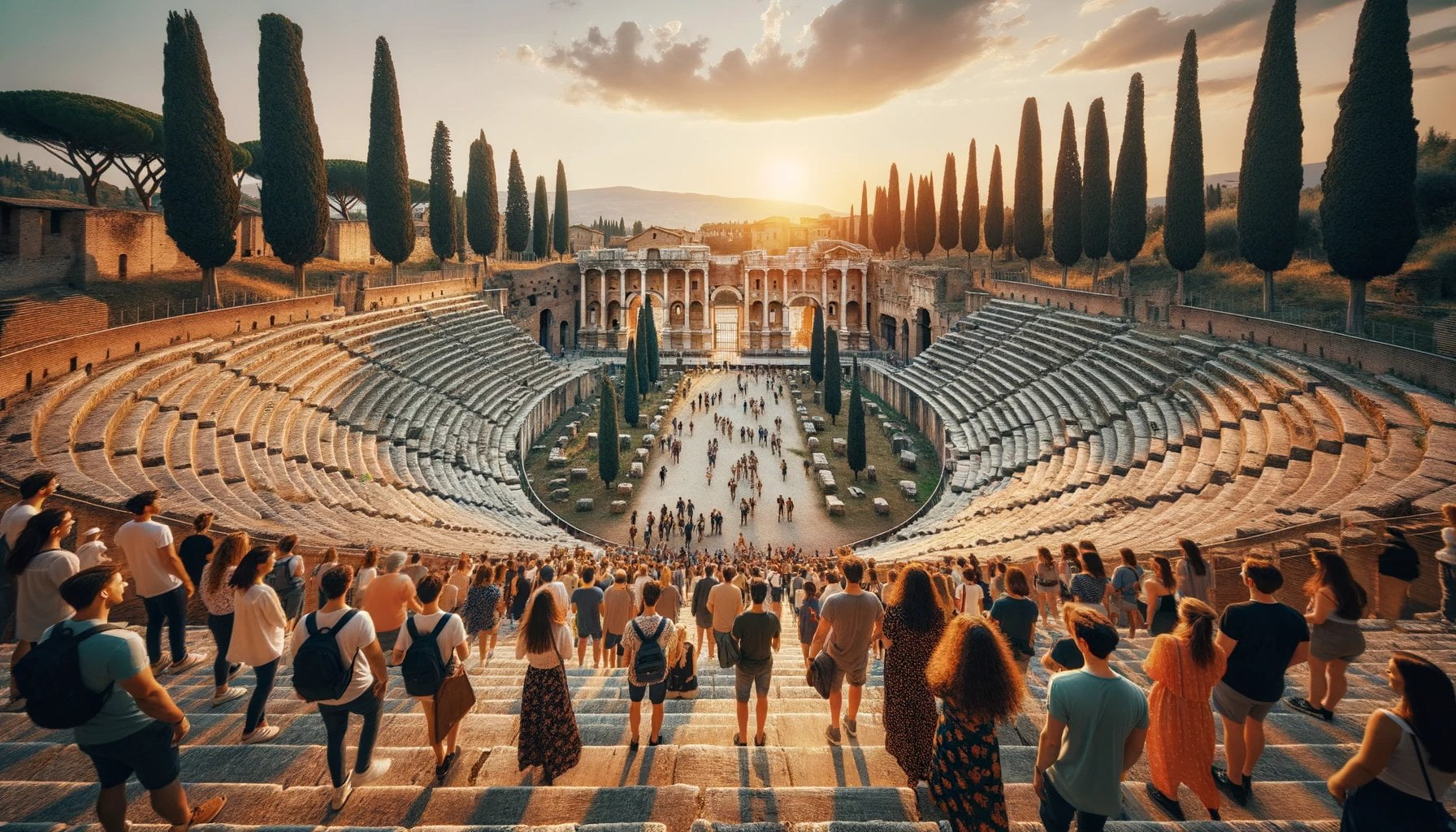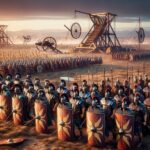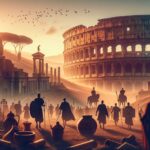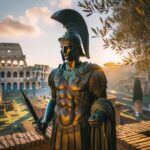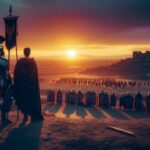Explore the remarkable achievements of the ancient Romans as we journey through their legacy that has left an indelible mark on human history. From their groundbreaking advancements in governance, engineering, art, literature, and military tactics, this article delves into the enduring impact of the Roman civilization. As we unearth forgotten narratives and shed light on their influential contributions, prepare to be captivated by the extraordinary insights into this ancient world.
Key Takeaways:
- The ancient Romans had an extensive road network that facilitated efficient travel and communication throughout their empire.
- They improved aqueducts for water supply and flow management in their cities.
- The Romans developed a sophisticated legal system, influencing legal practices in many civilizations.
- They were among the first to introduce and establish the idea of representative government.
- The Romans were skilled architects, constructing impressive structures like the Colosseum in Rome.
- They made advancements in engineering and construction techniques, allowing them to achieve remarkable feats.
- The Romans introduced the numeral system that we know today as Roman numerals.
- Roman authors and philosophers, such as Virgil, Ovid, and Cicero, made significant contributions to literature and philosophy.
These accomplishments of the ancient Romans have left a lasting legacy, influencing various cultures and civilizations.
Ancient Roman Achievements: Uncovering Their Enduring Legacy
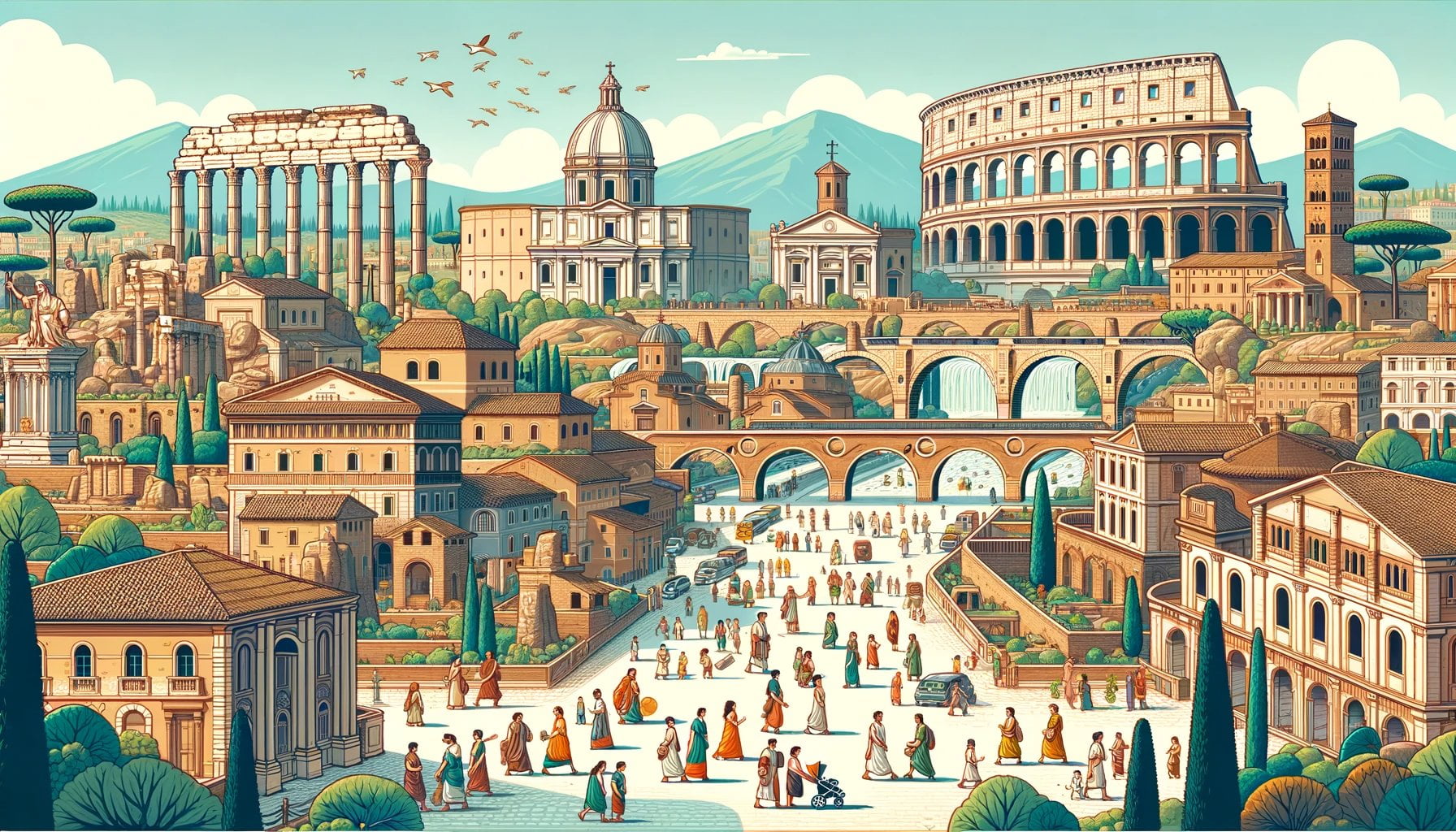
- Did you know that the ancient Romans were responsible for numerous impressive achievements that shaped Western civilization? Let’s delve into some of their remarkable accomplishments in various fields:
1. Extensive Road Network: Paving the Way for Travel and Communication
- The ancient Romans constructed an extensive network of roads throughout their vast empire. These roads not only facilitated efficient travel but also acted as crucial communication links between different regions. The Romans built over 400,000 kilometers of roads, connecting all corners of their empire!
2. Impressive Aqueducts: Mastering Water Supply and Flow Management
- The Romans took the existing concept of aqueducts and made significant improvements. These engineering marvels were vital for supplying water and managing its flow in their cities. The Pont du Gard in France, a towering aqueduct constructed by the Romans, is a testament to their exceptional engineering skills.
3. Sophisticated Legal System: Influencing Legal Practices
- Roman law established the foundations for legal systems in many civilizations. They developed a sophisticated legal system that emphasized principles such as due process and the presumption of innocence. These concepts still underpin modern legal systems around the world.
4. Representative Government: Pioneering the Idea of Democracy
- The Romans introduced and established the idea of representative government. They had elected officials, known as senators and magistrates, who represented the interests of the people. This system of governance laid the groundwork for the democratic principles we value today.
5. Architectural Marvels: Building Monuments That Stand the Test of Time
- The Romans left behind magnificent structures that continue to awe us today. The Colosseum in Rome, a grand amphitheater, stands as a testament to their architectural prowess. From the majestic Pantheon to the iconic Roman Forum, their structures still inspire awe and admiration.
6. Advancements in Engineering and Construction Techniques: Pushing Boundaries
- The Romans were innovative builders who achieved astonishing engineering feats. They perfected construction techniques and built enduring structures such as aqueducts, temples, theaters, and bridges. Their ability to create durable buildings using arches and vaults revolutionized architecture during their time.
7. Roman Numerals: A Timeless System
- The Romans introduced a numeric system that is still used in some contexts today. Roman numerals can be found on clock faces, in movie credits, and in other applications. Despite the rise of the Hindu-Arabic numeral system, Roman numerals remain embedded in our culture.
8. Contributions to Literature and Philosophy: Shaping Intellectual Discourse
- Roman authors and philosophers made significant contributions to literature and philosophy. The works of writers such as Virgil, Ovid, and Cicero are still cherished for their insights into human nature, political philosophy, and poetic excellence. Their writings continue to shape the intellectual discourse of our time.
The ancient Romans were an extraordinary civilization that achieved greatness in multiple fields. Their contributions in governance, engineering, art, literature, and military tactics have left an indelible mark on human history. From their extensive road network to their legal system and architectural marvels, their achievements continue to be admired and studied by historians and enthusiasts alike.
Sources:
– 10 Major Achievements of the Ancient Roman Civilization
– Here are the Greatest Ancient Roman Achievements in History
– 10 Roman Accomplishments and Achievements – Have Fun With History
The largest naval battle in ancient history was a spectacle of epic proportions. Imagine the clash of mighty warships, the swirling currents, and the deafening roar of battle. Experience the awe of this historic event by delving into the details of the largest naval battle in ancient history.
Check it out: largest naval battle in ancient history
Palaces in ancient Egypt were grandiose structures that reflected the power and wealth of the pharaohs. Step into the world of the ancient Egyptian elite and explore the opulent beauty of their palaces.
Discover more: palaces in ancient Egypt
Ancient dog epitaphs provide a glimpse into the deep bond between humans and their furry companions throughout history. Uncover heartwarming and sometimes humorous inscriptions dedicated to our loyal four-legged friends.
Learn more: ancient dog epitaphs
Journey to an ancient city in Peru and be enveloped by the mystique of its ancient ruins. Traces of past civilizations whisper stories of a rich history waiting to be uncovered.
Explore further: ancient city in Peru
The ancient Vietnamese warriors were known for their exceptional bravery and unwavering loyalty. Immerse yourself in the tales of these formidable fighters who left an indelible mark on Vietnamese history.
Unleash the warrior within: ancient Vietnamese warrior
Ancient Egyptian queen names evoke images of regal beauty and unparalleled power. Dive into the enchanting world of ancient Egypt and discover the names of these influential queens.
Unveil their majesty: ancient Egyptian queen names
Ancient Syrian names carry the weight of centuries, reflecting the rich cultural heritage of the region. Travel through time and explore the captivating world of ancient Syria with its unique and meaningful names.
Uncover the mysteries: ancient Syrian names
Step into the realms of royalty with a journey into ancient queen names. From legendary figures to lesser-known rulers, discover the names that were once whispered in the halls of palaces.
Unveil the secrets: ancient queen names
Ancient Persian inventions were ahead of their time, pushing the boundaries of technological innovation. Embark on a discovery of the ingenious creations that shaped ancient Persia’s legacy.
Uncover their brilliance: ancient Persian inventions
Imposing and steeped in history, ancient castles in Africa hold tales of valiant knights, fierce battles, and noble lords. Immerse yourself in the enchanted world of African castles and experience the echoes of the past.
Begin your adventure: ancient castles in Africa
Ancient Greek castles stand as timeless testaments to the strategic prowess and architectural excellence of the ancient Greeks. Step into the legendary world of gods and heroes as you explore these formidable fortresses.
Unleash your inner hero: ancient Greek castles
Among the ruins of an ancient Italian city lies a captivating story of triumph and tragedy. Discover the remnants of a once-thriving city and immerse yourself in the beauty of its ancient heritage.
Unveil the secrets: ancient Italian city
Influential Contributions to Art and Literature
The ancient Romans were not only known for their impressive architectural feats and engineering marvels but also for their influential contributions to art and literature. Their creativity and artistic prowess left an indelible mark on human history, shaping the development of Western art and literature for centuries to come. Let’s delve into some of their most noteworthy achievements in these fields.
Roman Art: A Celebration of Beauty and Power
Roman art was characterized by its grandeur, attention to detail, and a strong focus on capturing the essence of beauty and power. The Romans drew inspiration from the Greeks and developed their own distinctive artistic style, blending it with their unique cultural and historical background.
Emphasizing Realism: One of the key characteristics of Roman art was its emphasis on realism. Roman artists sought to depict the human form with accuracy, capturing expressions, and showcasing the intricate details of the human body. Sculptures like the famous “Augustus of Prima Porta” portray the idealized human figure with remarkable precision, showcasing the Roman fascination with the human form.
Monumental Architecture: The Romans were renowned for their monumental architectural structures, which served as a canvas for their artistic expression. From the majestic Colosseum to the awe-inspiring Pantheon, these structures showcased intricate detailing, elaborate sculptures, and intricate frescoes that narrated stories of valor, mythology, and historical events.
Mosaic Artistry: Another notable contribution of the Romans was their mastery of mosaic art. Mosaics adorned the floors and walls of Roman villas, public buildings, and even bathhouses. These intricate artworks showcased scenes from everyday life, mythology, and nature, combining colored stones and tiles to create breathtaking visual narratives.
Roman Literature: Tales that Transcend Time
Influenced by their Greek predecessors, the Romans made significant contributions to the world of literature. Their writings spanned various genres, including poetry, drama, history, and philosophy, leaving behind a rich literary heritage that continues to captivate readers to this day.
Epic Poetry: Roman poets, such as Virgil with his epic poem “The Aeneid,” celebrated the Roman values of bravery, duty, and heroism. They crafted grand narratives that explored both the mythological and historical aspects of Roman society, immortalizing legendary figures and recounting tales of conquest and adventure.
Historical Accounts: The Romans were meticulous chroniclers of their own history. Writers like Livy and Tacitus documented the rise and fall of the Roman Empire, providing valuable insights into the political, social, and cultural fabric of ancient Rome. Their works continue to serve as invaluable sources for historians and scholars.
Philosophical Thought: Roman philosophers, such as Seneca and Marcus Aurelius, delved into questions of ethics, morality, and the nature of the human condition. Their philosophical treatises, often presented in the form of letters or essays, offered guidance on virtuous living and contemplation of life’s deeper meaning.
The Influence of Ancient Rome: The influence of Roman art and literature extended far beyond the borders of the Roman Empire. Even centuries after its decline, Roman artistic and literary traditions continued to inspire and shape the cultural landscape of Western civilization. Renaissance artists, for example, drew inspiration from Roman sculpture, while neoclassical writers and thinkers looked to ancient Roman literature for guidance and inspiration.
Key Takeaways:
- Roman art emphasized realism, with sculptures like the “Augustus of Prima Porta” showcasing the Romans’ mastery of capturing the human form in exquisite detail.
- Monumental architecture, such as the Colosseum and the Pantheon, showcased elaborate sculptures and intricate frescoes, narrating stories of valor and mythology.
- Mosaics adorned Roman structures, combining colored stones and tiles to create intricate visual narratives.
- Roman literature spanned various genres, including epic poetry, historical accounts, and philosophical treatises.
- Works like Virgil’s “The Aeneid” celebrated Roman values, while historians like Livy and Tacitus chronicled Roman history in detail.
- Roman philosophy explored ethical and moral questions, as seen in the works of Seneca and Marcus Aurelius.
- Roman art and literature continue to inspire and shape Western culture, with their influence visible in Renaissance art and neoclassical literature.
Sources:
- “Art in Ancient Rome,” www.metmuseum.org/art/online-features/metkids/explore/art-in-ancient-rome.
- “Roman Literature,” www.britannica.com/.
Military Tactics and the Roman Army
The success of the Roman army can be attributed to several factors, including their ability to borrow and adapt tactics, efficient research and design of weapons, and a strong sense of discipline.
Borrowing Tactics
The Romans were not afraid to learn from superior armies and implemented successful tactics, making their own army more efficient. They embraced standardization, systematization, and practical borrowing, copying and adapting tactics from outsiders. This flexibility in tactics and methods allowed the Romans to create a more effective fighting force, constantly evolving their strategies.
Research and Design of Weapons
Roman engineering was unmatched in Europe, and their efficient research and design of weapons played a crucial role in their military success. They invested time and resources into developing advanced armors, siege weapons, blades, and even the wooden shaft of a pilum. The Romans constantly innovated and utilized their engineering skills, creating superior weaponry and armor that gave them an edge on the battlefield.
Discipline and Organization
The highly disciplined and organized tactics of the Roman army were integral to their triumphs. The Roman military emphasized discipline and cohesion, with the concept of Roman citizenship under arms embodied in the legion. This strong sense of discipline allowed the Romans to effectively communicate and execute their battle plans, giving them a significant advantage over their adversaries.
source: Wikipedia
Key Takeaways:
– The success of the Roman army was attributed to their ability to borrow and adapt tactics, ensuring they were always evolving and learning from superior armies.
– Efficient research and design of weapons allowed the Romans to create advanced armors and weaponry that gave them an advantage on the battlefield.
– The Roman military’s strong sense of discipline and organization played a crucial role in their victories.
With their ability to learn from others, innovative engineering, and unwavering discipline, the Roman army forged an empire that would dominate the Mediterranean world for centuries. Their military tactics and achievements are a testament to their lasting influence on human history.
Their Enduring Legacy and Impact on Human History
The ancient Romans have left an indelible mark on human history through their remarkable achievements. Spanning multiple fields, their enduring legacy continues to shape various aspects of our modern world. Let’s explore some key points about their contributions and the impact they have had on our society.
Law
- The Romans introduced groundbreaking concepts to the legal systems that still resonate today. They believed in the equality of all individuals under the law, regardless of social class. This principle laid the foundation for modern legal systems, emphasizing fairness and justice for all.
- Roman law established essential pillars of a legal framework that are still in practice today. Trial by jury, civil rights, personal wills, and business laws were major advancements that have stood the test of time. These principles ensure the protection of individuals’ rights and the smooth functioning of societies.
- With Rome’s separation of government branches into executive, legislative, and judiciary, along with the introduction of checks and balances, they laid the groundwork for the systems of governance we see in democracies around the world today.
[Source: World History Encyclopedia]
Technology & Engineering
- The Romans were pioneers in engineering, science, art, and architecture. Their advancements in these fields have had a lasting impact on human civilization.
- They were responsible for inventing or developing many everyday items that we still use today. From their mastery of arches to their construction of aqueducts, Romans pushed the boundaries of engineering and practicality.
- Their engineering marvels, such as aqueducts and roads, were not only functional but also visually stunning. These structures showcased the Romans’ ingenuity and precision in creating lasting infrastructure that served their empire.
[Source: Learnodo Newtonic]
Cultural Transmission & Adaptation
- The Romans had a remarkable policy of borrowing and building upon concepts and inventions from other cultures. They didn’t hesitate to recognize advancements made by others, adapting and refining them to enhance their own society.
- One notable example of Roman cultural adaptation is the development of amphitheaters. Roman architects took inspiration from other civilizations, perfecting the design and construction techniques, which eventually gave birth to iconic structures like the Colosseum.
- The cultural influences of Rome can still be seen today in various aspects of Western culture. Western art, architecture, and societal structures bear traces of Rome’s influence, reflecting a rich legacy of adaptability and refinement.
[Source: World History Encyclopedia]
Public Services
- The Romans were pioneers in the establishment of public services that contributed to the well-being and safety of their population.
- The first fire brigade, led by Marcus Licinius, was established by the Romans as part of their commitment to public safety. They recognized the importance of protecting their citizens and taking swift action to prevent disasters.
- Rome’s sophisticated system of roads played a crucial role in efficient transportation and communication. This network of roads enabled the smooth functioning of their empire, making trade, governance, and military operations more efficient.
[Source: World History Encyclopedia]
Key Takeaways:
- The ancient Romans introduced groundbreaking concepts to the legal systems, emphasizing equality under the law, civil rights, trial by jury, and checks and balances.
- Roman engineering marvels, such as arches, aqueducts, and roads, continue to inspire awe and admiration today.
- Rome’s cultural adaptability and refinement left a lasting imprint on Western society, influencing art, architecture, and societal structures.
- The Romans pioneered public services, such as the first fire brigade and a sophisticated road network, contributing to public safety and efficient governance.
[Source: World History Encyclopedia, Learnodo Newtonic]
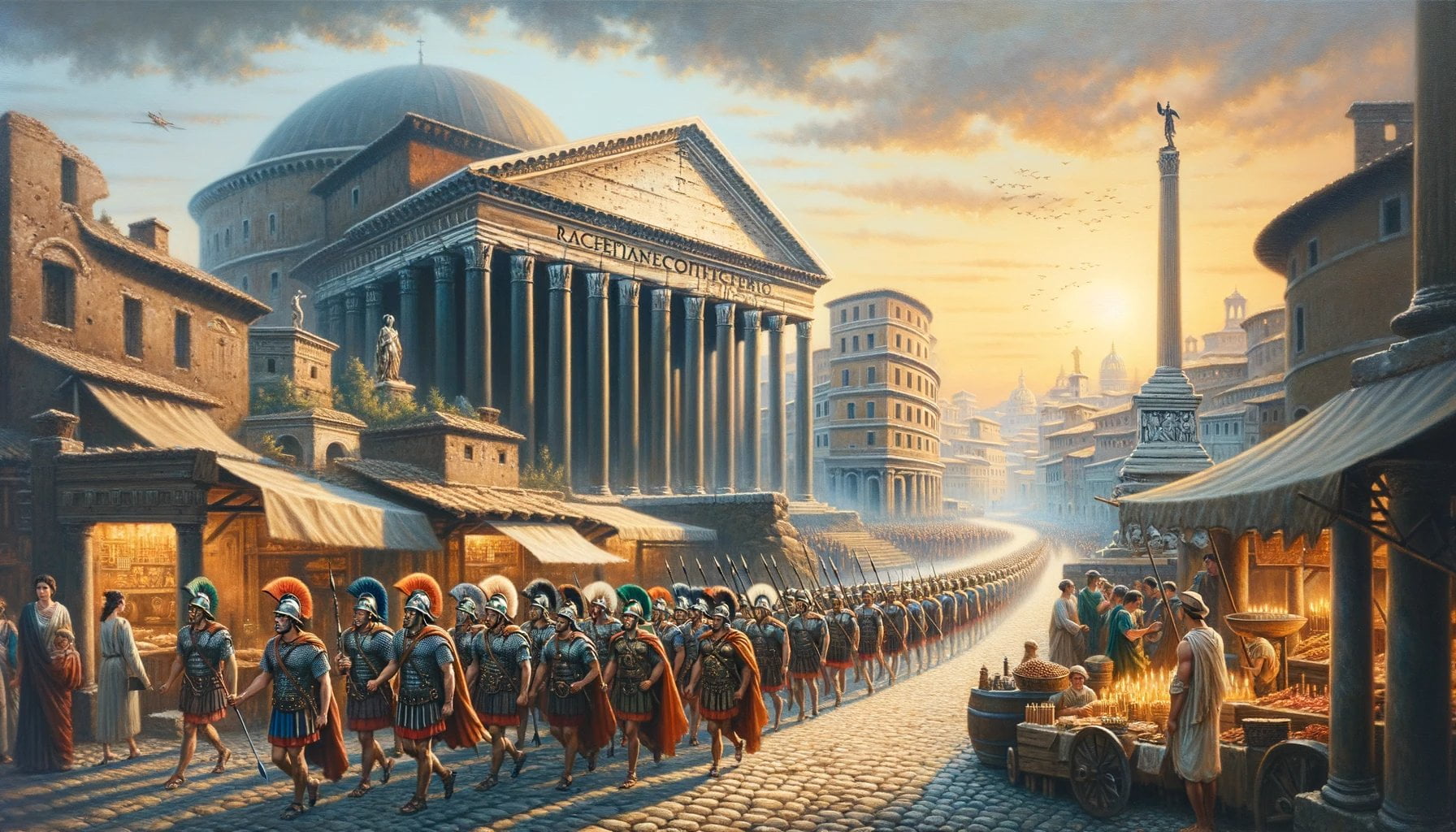
FAQ
Q1: What were some of the key accomplishments of ancient Rome?
A1: Ancient Rome had numerous achievements in various fields, including engineering, law, architecture, literature, and philosophy. Some of their notable accomplishments include the construction of an extensive road network, the development of impressive aqueducts for water supply, the establishment of a sophisticated legal system, the introduction of representative government, the creation of architectural marvels like the Colosseum, the advancements in engineering and construction techniques, the invention of Roman numerals, and significant contributions to literature and philosophy.
Q2: What is the significance of the Roman arch in Western architecture?
A2: The Roman arch, developed by the ancient Romans, became a foundational aspect of Western architecture. This curved symmetrical structure allowed for even distribution of weight along supports, preventing structures from collapsing. The use of the Roman arch revolutionized architectural design and influenced the construction of monumental structures such as aqueducts, bridges, and amphitheaters.
Q3: What makes Roman aqueducts engineering marvels?
A3: Roman aqueducts are considered engineering marvels due to their sophisticated design and impressive construction. The ancient Romans improved upon the concept of aqueducts and built an extensive network of water channels that supplied cities with a steady and reliable water source. The precision engineering, use of arches, and gravity-driven flow management of Roman aqueducts showcased the advanced technical skills of the Romans.
Q4: What is the historical significance of the Colosseum?
A4: The Colosseum, also known as the Flavian Amphitheatre, is a magnificent structure built by the ancient Romans. It served as a venue for various spectacles, including gladiatorial contests and public events. The Colosseum remains one of the largest amphitheaters ever built and stands as a testament to the architectural prowess of the ancient Romans. It is a symbol of their grandeur and cultural impact.
Q5: How did the Roman army achieve success in battle?
A5: The success of the Roman army can be attributed to several factors, including their ability to borrow and adapt tactics from superior armies, efficient research and design of weapons, and a strong sense of discipline. The Romans learned from other civilizations and incorporated effective strategies into their own military tactics. Their engineering skills contributed to the development of advanced weaponry, and their highly disciplined and organized approach to battle allowed for effective execution of their plans. These factors combined to make the Roman army a formidable force.
- Star Ring Trends: Etsy vs Amazon - March 28, 2025
- Boost Pollinator Habitats: Baby Blue Eyes Sustainable Farming Guide - March 28, 2025
- Protect Big Black Bears: Effective Conservation Strategies - March 28, 2025
